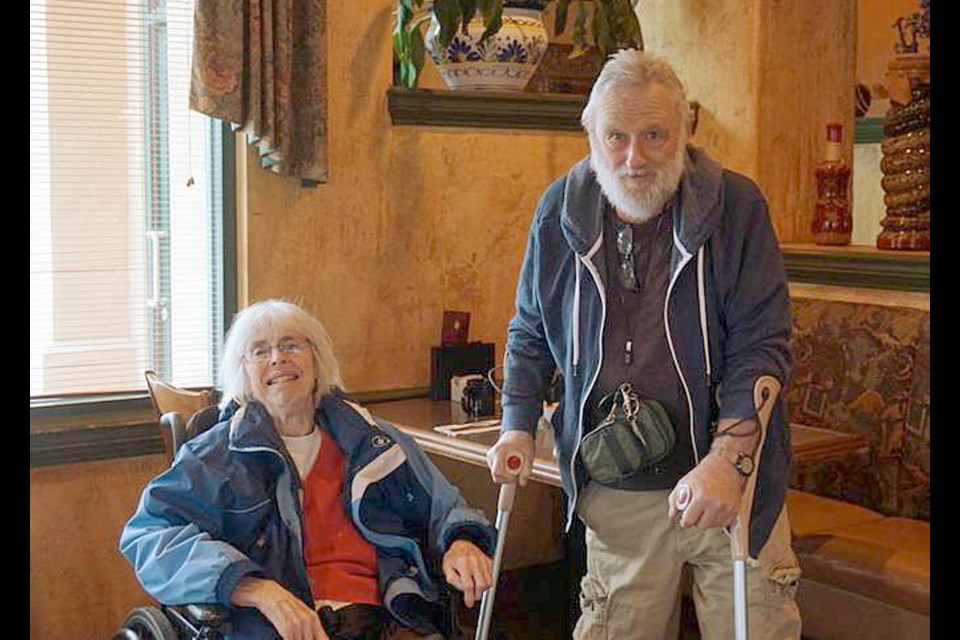Kay and Ernie Sievewright were partners in life and had hoped to be partners in death.
But their wish to have medical assistance in dying together was denied, even though they were each approved for the procedure independently — highlighting some of the grey areas practitioners are facing seven months after the Medical Assistance in Dying Act passed into law.
The Sievewrights might be the first couple to have both received medical assistance in dying in Canada.
They died last week, four days apart.
Friends described the Crofton couple as having an incomparable bond. They met in Ireland and moved to Ontario before settling in B.C. about 30 years ago.
They were married for 55 years.
“They just had a beautiful, beautiful bond that just — some day, I’d like to have that kind of bond,” said Holly Fox, who was present for their deaths. “He was a gruff guy, but very loving. Kay was no-nonsense.”
Kay had multiple sclerosis. After she fell and broke her hip, her condition got worse and worse, said Trevor Cook, who knew the couple for 40 years.
Ernie had spinal stenosis, which puts pressure on the spinal cord and nerves that travel through the spine to the arms and legs. When he died, he had no feeling below his waist and had a failing heart and kidneys.
They each applied and were approved for medical assistance in dying.
“Everything, they did together. [Assisted dying] was just another thing. They figured if they both got the approval, which they did, they’d go together,” Cook said.
About three weeks before they died, they were told they would have to do so separately.
“It was heartbreaking for all of us. And as far as I’m concerned, extremely cruel,” Fox said.
The decision came based on advice from the Canadian Medical Protective Association. The association provides legal advice to physicians and is fielding hundreds of questions from practitioners about the new legislation.
Dr. Douglas Bell, associate executive director of the association, said he couldn’t speak specifically about the Sievewrights, but spoke in general terms: “The legislation is quite clear that the request has to be voluntary and they are not under any influence. … It may well be that one member of the couple is being influenced by the other member of the couple and the reason why they’re agreeing to the pact is not entirely without influence.
“Out of an abundance of caution, it is our advice that you can’t be sure that one member of the couple isn’t under influence, even if both members qualify.”
The association has received 478 requests for legal advice relating to assisted dying since August 2015.
Other areas of concern for doctors include the requirement that death must be “reasonably foreseeable,” Bell said. “That’s not a medical term. There’s really no definition.”
Some U.S. legislation defines foreseeable as six months, while other jurisdictions have said two months or five years. Further, death is more predictable with some conditions, such as cancers, and less predictable in others such as diabetes.
The association is not aware of any lawsuits, doctors’ college investigations or coroners’ investigations regarding any cases of assisted dying. It has received one other legal question from a physician concerned about influence, relating to a different couple.
Shanaaz Gokool, CEO of advocacy group Dying with Dignity Canada, said it’s important that physicians are legally protected.
But she said that if both people in a couple met the criteria and their assessments found they independently wanted assistance in dying, then they should be given their wish to die together.
“Dignity is part of the discussion around medical aid in dying. And for these two people, it was part of that whole discussion,” Gokool said.
“There are people who want to die and they may want their family members there. Is there a coercive influence in having anyone there besides them? I think it’s an important consideration, but I think that it’s about how they define what matters to them from the perspective of what dignity means.”
Kay and Ernie each died at home, on Jan. 11 and 15, with friends in the room and favourite Irish ballads playing. Their wedding song, Michael, Row Your Boat Ashore, was played multiple times.
“If they had their preference, it would have been together, holding hands, the way they spent their life,” Cook said.



